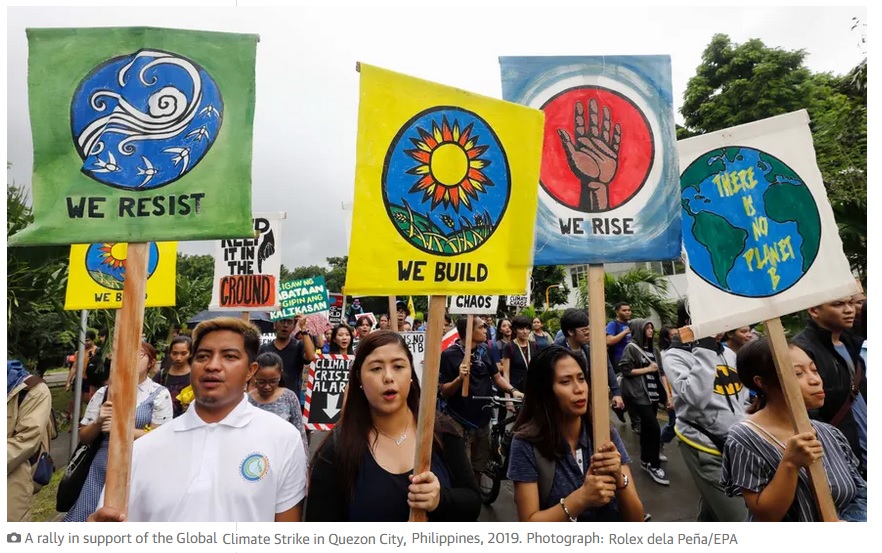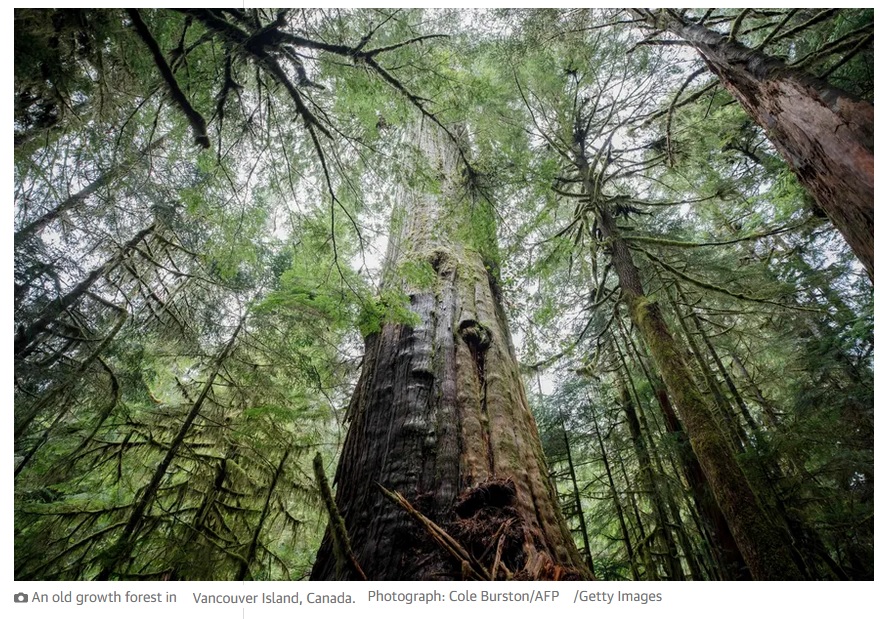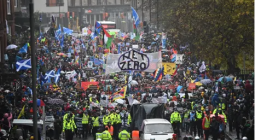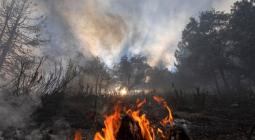Ten ways to confront the climate crisis without losing hope

Reconstruction after Covid: a new series of long reads
It’s easy to despair at the climate crisis, or to decide it’s already too late – but it’s not. Here’s how to keep the fight alive
The world as we knew it is coming to an end, and it’s up to us how it ends and what comes after. It’s the end of the age of fossil fuel, but if the fossil-fuel corporations have their way the ending will be delayed as long as possible, with as much carbon burned as possible. If the rest of us prevail, we will radically reduce our use of those fuels by 2030, and almost entirely by 2050. We will meet climate change with real change, and defeat the fossil-fuel industry in the next nine years.
If we succeed, those who come after will look back on the age of fossil fuel as an age of corruption and poison. The grandchildren of those who are young now will hear horror stories about how people once burned great mountains of poisonous stuff dug up from deep underground that made children sick and birds die and the air filthy and the planet heat up.
We must remake the world, and we can remake it better. The Covid-19 pandemic is proof that if we take a crisis seriously, we can change how we live, almost overnight, dramatically, globally, digging up great piles of money from nowhere, like the $3tn the US initially threw at the pandemic.
The climate summit that just concluded in Glasgow didn’t get us there, though many good and even remarkable things happened. Those people who in many cases hardly deserve the term “leader” were pulled forward by what activists and real leaders from climate-vulnerable countries demanded; they were held back by the vested interests and their own attachment to the status quo and the profit to be made from continued destruction. As the ever-acute David Roberts put it: “Whether and how fast India phases out coal has nothing at all to do with what its diplomat says in Glasgow and everything to do with domestic Indian politics, which have their own logic and are only faintly affected by international politics.”
Six months ago, the usually cautious International Energy Agency called for a stop to investment in new fossil-fuel projects, declaring: “The world has a viable pathway to building a global energy sector with net-zero emissions in 2050, but it is narrow and requires an unprecedented transformation of how energy is produced, transported and used globally.” Pressure from activists pushed and prodded the IEA to this point, and 20 nations committed at Cop26 to stop subsidies for overseas fossil fuel projects.
The emotional toll of the climate crisis has become an urgent crisis of its own. It’s best met, I believe, by both being well grounded in the facts, and working towards achieving a decent future – and by acknowledging there are grounds for fear, anxiety and depression in both the looming possibilities and in institutional inaction. What follows is a set of tools I’ve found useful both for the inward business of attending to my state of mind, and for the outward work of trying to do something about the climate crisis – which are not necessarily separate jobs.
1. Feed your feelings on facts
Beware of feelings that aren’t based on facts. I run across a lot of emotional responses to inaccurate analysis of the situation. Sometimes these are responses to nothing more than a vague apprehension that we’re doomed.
One of the curious things about the climate crisis is that the uninformed are often more grim and fatalistic than the experts in the field – the scientists, organisers and policymakers who are deep in the data and the politics. Too many people like to spread their despair, saying: “It’s too late” and “There’s nothing we can do”. These are excuses for doing nothing, and erase those doing something. That’s not what the experts say.
We still have time to choose the best rather than the worst scenarios, though the longer we wait the harder it gets, and the more dramatic the measures are required. We know what to do, and that knowledge is getting more refined and precise, but also more creative, all the time. The only obstacles are political and imaginative.
2. Pay attention to what’s already happening
Another oft-heard complaint is “nobody is doing anything about this”. But this is said by people who are not looking at what so many others are doing so passionately and often effectively. The climate movement has grown in power, sophistication and inclusiveness, and has won many battles. I have been around long enough to remember when the movement against what was then called “global warming” was small and mild-mannered, preaching the gospel of Priuses and compact fluorescent lightbulbs, and mostly being ignored.
One of the victories of climate activism – and consequences of dire climate events – is that a lot more people are concerned about climate than they were even a few years years ago, from ordinary citizens to powerful politicians. The climate movement – which is really thousands of movements with thousands of campaigns around the world – has had enormous impact.
In the US, where I live, a lot is happening at the local, state and federal levels. Local measures can seem insignificant, but often they scale up. For example, a few years ago the Californian city of Berkeley decided to ban the installation of gas appliances in new buildings. Berkeley is one small city, so it would be easy to dismiss the impact – but now more than 50 California municipalities have followed suit, and all-electric could become standard far beyond the state. In the UK, the group Insulate Britain has staged blockades while demanding that the government improve building insulation standards, which is something I never imagined people would protest about. But insulation is a survival and justice issue in this coming winter of rising fuel costs and scarcity, as well as a climate issue.
There are organisations, initiatives and legislation on various scales, and there is a scale that is right for everyone. Sometimes it’s getting your college to divest, or your city to change building regulations, or your state to adopt an aggressive clean-energy plan (as Oregon did this summer) or ban fracking (as New York State did a few years ago) or protect an old-growth forest.
If some past victories are hard to see, it’s because there’s nothing left behind to see: the coal-fired plant that was never built, the pipeline that was stopped, the drilling that was banned, the trees that weren’t chopped down. As my friend Daniel Jubelirer of the Sunrise Project advises, if you find the sheer volume of data and issues overwhelming, join up, learn as you go and perhaps pick an area to master.

3. Look beyond the individual and find good people
When I ask people what they’re doing about the climate crisis, they often cite virtuous lifestyle choices, such as being vegan or not flying. Those are good things to do. They are also relatively insignificant. The world must change, but it won’t happen because one person does or does not consume something – and I would prefer we not imagine ourselves primarily as consumers.
As citizens of the Earth, we have a responsibility to participate. As citizens massed together, we have the power to affect change, and it is only on that scale that enough change can happen. Individual choices can slowly scale up, or sometimes be catalysts, but we’ve run out of time for the slow. It is not the things we refrain from doing, but those things we do passionately, and together, that will count the most. And personal change is not separate from collective change: in a municipality powered by clean energy, for instance, everyone is a clean-energy consumer.
If you live on a diet of mainstream news – which focuses on celebrities and elected politicians, and reserves the term “powerful” for high-profile and wealthy individuals – you will be told in a thousand ways that you have no role in the fate of the Earth, beyond your consumer choices.
Movements, campaigns, organisations, alliances and networks are how ordinary people become powerful – so powerful that you can see they inspire terror in elites, governments and corporations alike, who devote themselves to trying to stifle and undermine them. But these places are also where you meet dreamers, idealists, altruists – people who believe in living by principle. You meet people who are hopeful, or even more than hopeful: great movements often begin with people fighting for things that seem all but impossible at the outset, whether an end to slavery, votes for women or rights for LGTBQ+ people.
Values and emotions are contagious, and that applies whether you’re hanging out with the Zapatistas or the Kardashians. I have often met people who think the time I have spent around progressive movements was pure dutifulness or dues-paying, when in fact it was a reward in itself – because to find idealism amid indifference and cynicism is that good.
4. The future is not yet written
People who proclaim with authority what is or is not going to happen just bolster their own sense of self and sabotage your belief in what is possible. There was, according to conventional wisdom, never going to be marriage equality in Ireland or Spain, or a US president honouring trans visibility day, or Canada ceding 20% of its land mass to indigenous self-governance as Nunavut, or an end to Britain running on coal, or Costa Rica coming close to 100% clean energy. The historical record tells us that the unexpected happens regularly – and by unexpected, I mean unexpected to people who thought they knew what was going to happen.
In 2015, Christiana Figueres led 192 nations to a successful global climate treaty in Paris. But when she was first asked to take on the job, she blurted out that it was impossible. She took it on anyway, and the night before the treaty was announced, people around me were still saying it was impossible, and preparing for failure. Then it succeeded – not in finishing the job, but in moving it forward.
The future is not yet written. We are writing it now.

5. Indirect consequences matter
In September, Harvard University announced it would divest from fossil fuel. It took organisers 10 years to make that happen. For more than nine years you could have looked at the campaign as unsuccessful, even though it was part of a global movement that got trillions of dollars out of fossil-fuel investments, recast the fossil-fuel industry as criminal and raised ethical questions for all investors to consider. This month, Bloomberg News reported that the “cost of capital” for fossil fuel and renewable energy projects used to be comparable, but thanks largely to shareholder and divestment activists, the cost for fossil projects is now about 20%, while that for renewables is between 3% and 5%. This affects what gets funded and what is profitable.
The campaign against the Keystone XL oil pipeline was, for many years, a jumble of wins and losses and stalls and setbacks – and then finally the pipeline was completely halted when Joe Biden came into office. This was not a gift from Biden; it was a debt being paid to the climate activists who had made it an important goal. Patience counts, and change is not linear. It radiates outward like ripples from a stone thrown into a pond. It matters in ways no one anticipates. Indirect consequences can be some of the most important ones.
The Keystone XL campaign was long and hard, and the heroes who fought it did a lot of things besides stop one pipeline. They made the Alberta tar sands – one of the filthiest fossil fuel operations on Earth – far better recognised as an environmental atrocity and a global climate bomb that had to be defused. The organisers built beautiful coalitions between farmers, Native landholders, local communities and an international movement. They taught us why pipelines are a pressure point, and inspired people to fight and win many other pipeline battles.
The Keystone XL campaign may have helped inspire the Lakota leaders at Standing Rock who stood up against the Dakota Access pipeline in 2016. That struggle didn’t stop the pipeline but it may yet. It’s not over. And it did so much else. A friend from Standing Rock told me it gave hope to the Native youth there and elsewhere, and a sense of their own agency and value that mattered. It led to many remarkable things, including a huge intertribal gathering and the healing of old wounds – notably when hundreds of former US soldiers got down on their knees to apologise for what the US army did to Native Americans.
And it inspired one young woman, who had driven there from New York with her friends, to decide to run for office. You wouldn’t have heard of her then, but you have now: Alexandria Ocasio-Cortez. As a congresswoman, she did so much to amplify the need for a Green New Deal. The deal hasn’t passed Congress, but it did change the sense of what is possible, and it undid the old false divide between jobs and the environment. It seems to have shaped the Biden administration’s emphasis on green jobs as part of an energy transition, and as such it’s out there in the world now in the form of the Build Back Better legislation plan.
If you follow the ripples from Standing Rock, to a young woman’s decision to run for Congress, and the Sunrise Movement’s espousal of a new framework on climate action, you can see indirect change – which demonstrates that our actions often matter, even when we don’t achieve our primary goal immediately. And even if we do, the impact may be far more complex than we had anticipated.

6. Imagination is a superpower
There is a sad failure of imagination at the root of this crisis. An inability to perceive both the terrible and the wonderful. An inability to imagine how all these things are connected, how what we burn in our powerplants and car engines pumps out carbon dioxide that goes up into the sky. Some cannot see that the world, which has been so stable for 10,000 years, is now destabilised, and full of new perils and dangerous feedback loops. Others cannot imagine that we can actually do what is necessary – which is nothing less than building a new and better world. This is one of the remarkable things about this crisis: though the early climate movement emphasised austerity, a lot of what we need to give up is poison, destruction, injustice and devastation. The world could be far richer by many measures if we do what this catastrophe demands of us. If we don’t, catastrophes such as the violent flooding that recently cut off Canada’s largest port and stranded the city of Vancouver are reminders that the cost of addressing the crisis is dwarfed by the cost of not doing so.
7. Check the facts (and watch out for liars)
Thinking about the future requires imagination, but also precision. Waves of climate lies have washed over the public for decades. The age of climate denial is largely over, succeeded by more subtle distortions of the facts, and by false solutions from those who seek to benefit from stasis.
Oil companies are spending a lot on advertising that features outright lies and the hyping of minor projects or false solutions. These lies seek to prevent what must happen, which is that carbon must stay in the ground, and that everything from food production to transportation must change.
There is a lot of fuss about carbon capture technologies – and a very nice old joke that the best carbon capture technology of all is called a tree. The nonexistent technology of large-scale, human-made carbon capture is often brought up to suggest that we can keep producing those emissions. We cannot. Geoengineering is another distraction beloved by technocrats, apparently because they can imagine big, centralised technological innovation, but not the impact of countless small, localised changes.
In 2017, Mark Jacobson of Stanford University’s Solutions Project concluded that almost every nation on Earth already has the natural resources it needs to transition to renewable energy. “We have the solutions” read a banner at the huge 2014 New York City climate march, and they have only grown more effective since then.

8. History can guide us
The American left, someone once told a friend of mine, is bad at celebrating its victories. (The same may well go for the left in other countries, too.) We have victories. Some of them are very large, and are why your life is the shape it is. The victories are reminders that we are not powerless, and our work is not futile. The future is not yet written, but by reading the past, we see patterns that can help us shape that future.
To remember that things were different, and how they were changed, is to be equipped to make change – and to be hopeful, because hope lies in the possibility of things being different. Despair and depression often come from the sense that nothing will change, or that we have no capacity to make that change.
Sometimes it helps to understand that this very moment is astonishing. Early in this century, we had no adequate alternative to fossil fuel. Wind and solar were relatively expensive and inefficient, and battery technology was still in its infancy. The most unnoticed revolution of our era is an energy revolution: solar and wind costs have plummeted as new, more efficient designs have been invented, and they are now widely considered to be more than adequate to power our future.
The scale of change in the past 50 years is evidence of the power of movements. The nation I was born into 60 years ago had tiny lesbian and gay rights movements, nothing resembling a feminist movement, a Black-led civil rights movement whose victories mostly lay ahead, and a small conservation movement that had not yet morphed into an environmental movement – and few recognised the systemic interdependences at the heart of environmentalism. A lot of assumptions were yet to be dismantled; a lot of alternatives yet to be born.
9. Remember the predecessors
We are the first generations to face a catastrophe of the reach, scale and duration of climate change. But we are far from the first to live under some kind of threat, or to fear what is to come. I often think of those who were valiant and principled in the death camps of Nazi Germany. I think of my Latin American neighbours, some of whom braved terrifying migrations, walking across the desert for days to escape death squads, dictatorships and climate catastrophe. I think of the Indigenous people of the Americas, who already lived through the end of their worlds when their lands were stolen, their populations decimated and colonial domination disrupted their lives and cultures in every possible way. What it took to persevere under those conditions is almost unimaginable, and also all around us.
Indigenous leadership has mattered tremendously for the climate movement, in specific campaigns and as ongoing testimony that there are other ways to think about time, nature, value, wealth and human roles. A report that came out this summer demonstrated how powerful and crucial Native leadership has been for the climate movement: “Indigenous resistance has stopped or delayed greenhouse gas pollution equivalent to at least one-quarter of annual US and Canadian emissions.”

10. Don’t neglect beauty
Climate chaos makes us fear that we will lose what is beautiful in this world. I want to say that in 50 years, and 100 years, the moon will rise, and be beautiful, and shine its silvery light across the sea, even if the coastline isn’t where it used to be. In 50 years, the light on the mountains, and the way every raindrop on a blade of grass refracts light will still be beautiful. Flowers will bloom and they will be beautiful; children will be born, and they, too, will be beautiful.
Only when it is over will we truly see the ugliness of this era of fossil fuels and rampant economic inequality. Part of what we are fighting for is beauty, and this means giving your attention to beauty in the present. If you forget what you’re fighting for, you can become miserable, bitter and lost.
For a long time we have told horror stories about ice and coral reefs and violent weather events to try to wake people up to the fact that the climate is changing. I have a different fear now – that this chaos will come to seem inevitable, and even normal, as war does to someone who has lived their life in wartime.
I believe we now need to tell stories about how beautiful, how rich, how harmonious the Earth we inherited was, how beautiful its patterns were, and in some times and places still are, and how much we can do to restore this and to protect what survives. To take that beauty as a sacred trust, and celebrate the memory of it. Otherwise we might forget why we are fighting.

THE GUARDIAN




